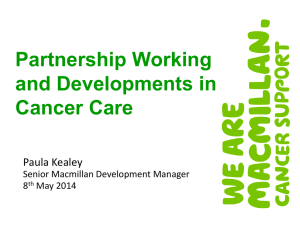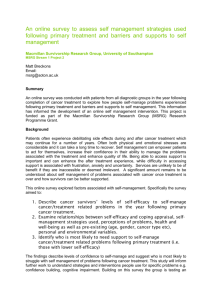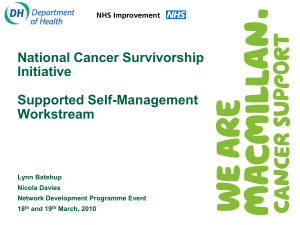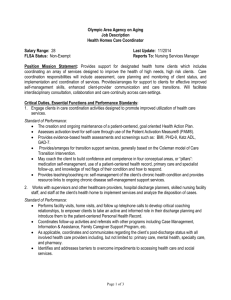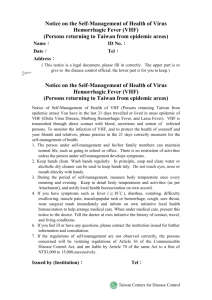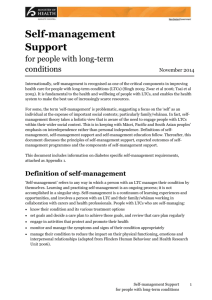the summary - Macmillan Cancer Support
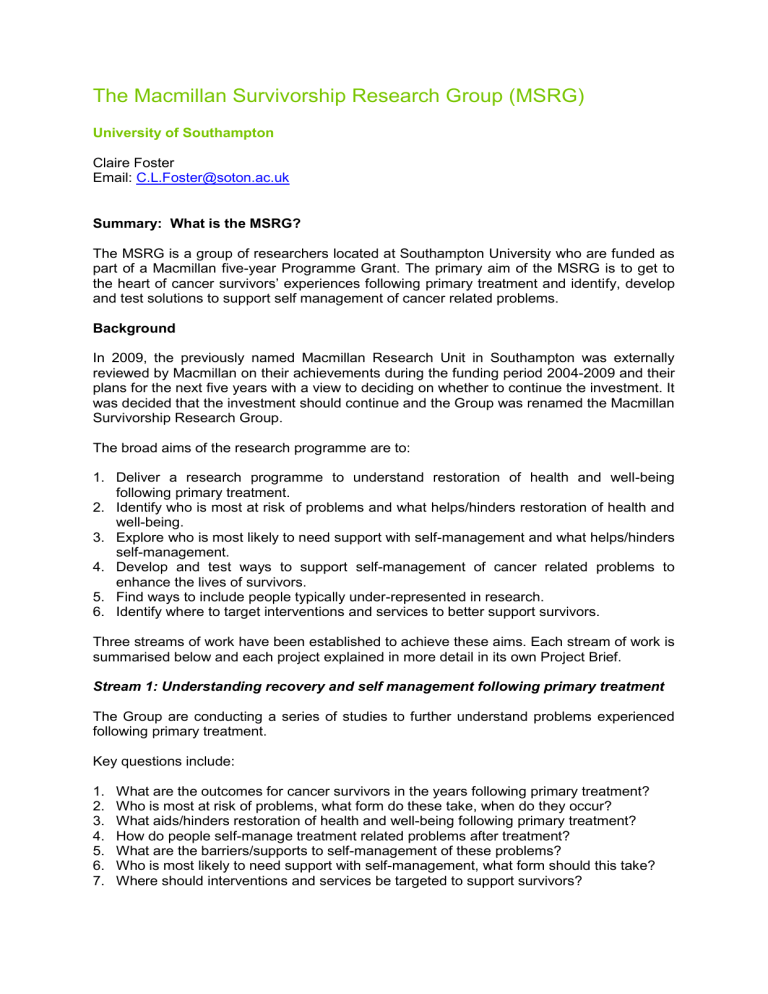
The Macmillan Survivorship Research Group (MSRG)
University of Southampton
Claire Foster
Email: C.L.Foster@soton.ac.uk
Summary: What is the MSRG?
The MSRG is a group of researchers located at Southampton University who are funded as part of a Macmillan five-year Programme Grant. The primary aim of the MSRG is to get to the heart of cancer survivors’ experiences following primary treatment and identify, develop and test solutions to support self management of cancer related problems.
Background
In 2009, the previously named Macmillan Research Unit in Southampton was externally reviewed by Macmillan on their achievements during the funding period 2004-2009 and their plans for the next five years with a view to deciding on whether to continue the investment. It was decided that the investment should continue and the Group was renamed the Macmillan
Survivorship Research Group.
The broad aims of the research programme are to:
1. Deliver a research programme to understand restoration of health and well-being following primary treatment.
2. Identify who is most at risk of problems and what helps/hinders restoration of health and well-being.
3. Explore who is most likely to need support with self-management and what helps/hinders self-management.
4. Develop and test ways to support self-management of cancer related problems to enhance the lives of survivors.
5. Find ways to include people typically under-represented in research.
6. Identify where to target interventions and services to better support survivors.
Three streams of work have been established to achieve these aims. Each stream of work is summarised below and each project explained in more detail in its own Project Brief.
Stream 1: Understanding recovery and self management following primary treatment
The Group are conducting a series of studies to further understand problems experienced following primary treatment.
Key questions include:
1. What are the outcomes for cancer survivors in the years following primary treatment?
2. Who is most at risk of problems, what form do these take, when do they occur?
3. What aids/hinders restoration of health and well-being following primary treatment?
4. How do people self-manage treatment related problems after treatment?
5. What are the barriers/supports to self-management of these problems?
6. Who is most likely to need support with self-management, what form should this take?
7. Where should interventions and services be targeted to support survivors?
To address these questions we began by: a. Establishing a prospective cohort of colorectal cancer survivors (CREW cohort) to map restoration of health and well-being and assess the relative importance of personal attributes, environmental supports and resources, socio-demographic and clinical factors to recovery. b. An online survey of patients who had completed primary radiotherapy/chemotherapy treatment in the past 12 months to identify self-management of treatment related problems and barriers/supports to self-management.
Stream 2: Co-creating and testing interventions to support self-management
The Group , in addressing aim 4 above, has developed and are in the process of testing an online resource to manage cancer related fatigue (RESTORE), bringing together clinical knowledge and lay expertise for people who have completed treatment, as one means of supporting self management of treatment related problems. This resource will offer tailored support and has been created in partnership (hence co-created ) with survivors, Macmillan partners, clinical teams and academic experts to maximise its relevance and reach.
Stream 3: User involvement and including those typically under-represented
The Group , in addressing aim 5 above, continues to develop ways to involve people typically under-represented in research (underpinning all their research activity) particularly older people, people living in remote areas, people from black and minority ethnic groups, people with low literacy and low socio-economic status.
Findings
The programme of work concludes 31 March 2014.
Why is this work important?
The research programme addresses the top priority of people affected by cancer by focusing on the impact of cancer on everyday life. By focusing on the experiences of recovery following primary treatment the programme will generate new knowledge about who is at risk of problems following cancer treatment, inform the provision of more efficient and effective services and identify self-management support interventions which could enhance people ’s return to productive lives following cancer.
Each project in the programme will complement other work being conducted by Macmillan.
Specifically it will inform Macmillan’s activity and strategic objectives in relation to improving cancer services through Survivorship (including NCSI objectives), Life Care, Information and
Support and Digital Media activities.
